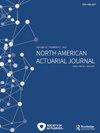Using Model Averaging to Determine Suitable Risk Measure Estimates
IF 1.6
Q3 BUSINESS, FINANCE
引用次数: 2
Abstract
Recent research in loss modeling resulted in a growing number of classes of statistical models as well as additional models being proposed within each class. Empirical results indicate that a range of models within or between model classes perform similarly well, as measured by goodness-of-fit or information criteria, when fitted to the same data set. This leads to model uncertainty and makes model selection a challenging task. This problem is particularly virulent if the resulting risk measures vary greatly between and within the model classes. We propose an approach to estimate risk measures that accounts for model selection uncertainty based on model averaging. We exemplify the application of the approach considering the class of composite models. This application considers 196 different left-truncated composite models previously used in the literature for loss modeling and arrives at point estimates for the risk measures that take model uncertainty into account. A simulation study highlights the benefits of this approach. The data set on Norwegian fire losses is used to illustrate the proposed methodology.使用模型平均来确定合适的风险度量估计
最近对损失建模的研究导致越来越多的统计模型类别以及在每个类别中提出的附加模型。经验结果表明,当拟合到相同的数据集时,通过拟合优度或信息标准来衡量,模型类内或模型类之间的一系列模型表现相似。这导致了模型的不确定性,并使模型选择成为一项具有挑战性的任务。如果产生的风险度量在模型类之间和模型类内部变化很大,那么这个问题就会特别严重。我们提出了一种估算风险度量的方法,该方法考虑了基于模型平均的模型选择不确定性。我们举例说明了该方法在复合模型类中的应用。该应用程序考虑了文献中先前用于损失建模的196种不同的左截断复合模型,并对考虑模型不确定性的风险度量进行了点估计。一项模拟研究强调了这种方法的好处。关于挪威火灾损失的数据集用于说明所提议的方法。
本文章由计算机程序翻译,如有差异,请以英文原文为准。
求助全文
约1分钟内获得全文
求助全文

 求助内容:
求助内容: 应助结果提醒方式:
应助结果提醒方式:


